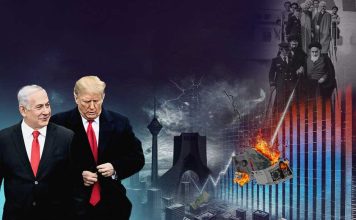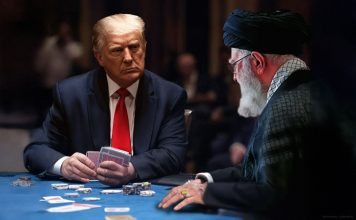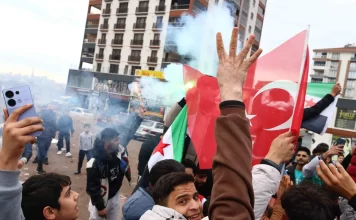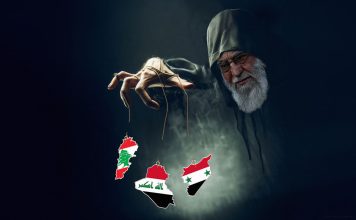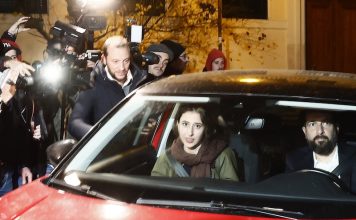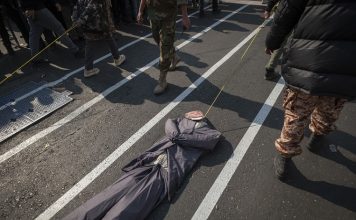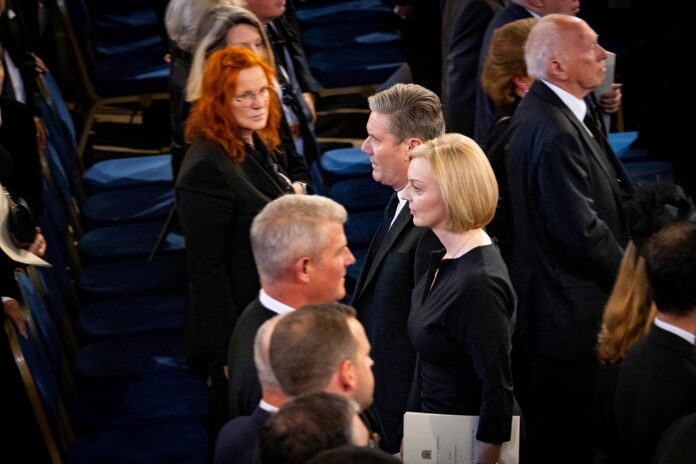
The United Kingdom’s new prime minister, Liz Truss, faces difficult foreign policy decisions as she begins her mandate — not least among them Iran’s increasingly close relationship with Russia, and the Iran nuclear deal, analysts say.
Truss became UK Prime Minister on Sept. 6, a day after she was selected as leader of the country’s conservative party following Prime Minister Boris Johnson’s resignation.
Until that point, Truss was UK foreign secretary, a role she took up on Sept.15, 2021. During her time as foreign secretary she helped to secure the release of the British-Iranians Nazanin Zaghari-Ratcliffe and Anoosheh Ashoori, who were detained in Iran.
[aesop_image img=”https://kayhanlife.com/wp-content/uploads/2021/12/2021-02-23T000000Z_700716715_MT1NURPHO000GH82FL_RTRMADP_3_TRADE-SECRETARY-LIZ-TRUSS-ON-DOWNING-STREET-scaled.jpg” panorama=”off” credit=”Liz Truss. REUTERS./ ” align=”center” lightbox=”on” captionsrc=”custom” captionposition=”left” revealfx=”off” overlay_revealfx=”off”]
[aesop_image img=”https://kayhanlife.com/wp-content/uploads/2022/09/2022-03-17T082614Z_511343565_MT1EYEIM246713_RTRMADP_3_BRITISH-IRANIAN-WOMAN-NAZANIN-FREED-TO-RETURN-TO-UK.jpg” panorama=”off” credit=”British Foreign Secretary Liz Truss greets British Iranian aid worker Nazanin Zaghari-Ratcliffe as she reunits with daughter Gabriella and husband Richard Ratcliffe in London, Britain, on Thursday March 17, 2022 after being freed from captive in Iran for six years. REUTERS./ ” align=”center” lightbox=”off” captionsrc=”custom” captionposition=”left” revealfx=”off” overlay_revealfx=”off”]
Truss is described as a pragmatist, for favoring a short-term approach to political matters, and for prioritizing domestic policy. She is also viewed as impulsive by analysts, who say her leadership style could create tensions within the conservative party.
“As foreign secretary, Liz Truss supported the UK, [US President Joe] Biden, and Europe’s position on the JCPOA [Joint Comprehensive Plan of Action], and has been persistently behind the ever-faltering talks,” said Charlotte Leslie, the director of the London-based Conservative Middle East Council — an organization which briefs conservative lawmakers about the Middle East — in an interview with Kayhan Life.
“She will likely be coming under increasing pressure from both inside the conservative party and beyond to review the realism of the talks, as facts alter on the ground and Israel-Iran tensions rise,” she added.
Israeli Minister Says Iran Using Syria Facilities for Weapons Production
Syria May ‘Return to Larger-Scale Fighting,’ U.N. Warns in New Report
Hostilities between Iran and Israel have reached an all-time high in recent years, following the start of a proxy conflict in 1985 between the countries.
Iran’s influence in the Middle East, its nuclear program and its tactical foothold in Syria have angered Israel. Meanwhile, former US President Donald Trump’s “maximum pressure campaign” and strong rhetoric against Iran — both supported by the Israeli government — as well as the 2020 peace agreements between Israel, Bahrain, Morocco, Sudan and the United Arab Emirates (UAE) have provoked Iran’s ire.
Truss’s historic emphasis on domestic affairs makes it difficult to assess whether Iran will be at the top of her agenda, and how she might address the corresponding challenges.
Speaking to The Times of London on Sept. 6, David Laws, a former lawmaker who worked with Truss said: “She is quite ideological and has a reasonably clear philosophy around competition, free markets and low taxes. The downside of that is that she is not always as interested at looking at the evidence.”
Acting as foreign secretary and speaking about Iran’s nuclear capability during a debate in the UK House of Commons on Oct. 26, Truss said, “Iran has no credible civilian justification for its nuclear escalation.”
“We absolutely must stop Iran securing those nuclear capabilities, and we are working closely with our allies across the world,” she said.
Turning to the nuclear deal, Truss said: “Iran urgently needs to return to the negotiating table and, if it does not engage meaningfully in negotiations, we will reconsider our approach.” She reiterated her stance on the nuclear deal at another House of Commons debate held on Jan. 25, adding that the deal had reached “a dangerous impasse.”
Iran’s evolving relationship with Russia is likely to become a critical issue for the UK in the coming months following Russia’s invasion of Ukraine in February.
Concerns by Ukraine and the US that Iran has been supplying Russia with military equipment resurfaced following the downing of a drone in Ukraine on Sept. 13 believed to be made by Iran.
Ukraine Shoots Down Iranian-Made Drone Used by Russia- Defence Ministry
The claim was supported by the UK’s defense ministry on Sept. 14 in its latest military intelligence update. The report held that it was “highly likely” that Russia used unmanned aerial vehicles (UAV) made by Iran for the war in Ukraine.
The conflict in Ukraine has impacted energy prices, and the cost of wheat and palladium globally. A significant supply of the world’s natural gas is provided by Russia, which it restricted to Europe following a rise in tensions. Since June 2021, Europe has seen a 60 percent drop in Russian gas deliveries. Should Russia decide to turn off its gas supply to Europe completely, Europe and the UK could be plunged into a recession.
“It is unlikely that as the wider consequences of Russia’s illegal invasion of Ukraine are felt across the world, [Truss] will be able to ignore the evolving alliances, especially of Russia and Iran,” Leslie said. “As the geopolitical tectonic plates shift, multilateralism is likely to come under pressure, and competition for alliances is likely to intensify. Prime Minister Truss’s challenge will be to confirm to a watching world that the UK and the West are allies of strength, sound judgement and reliability.”
Iran’s open hostility towards the UK adds another layer of difficulty for Truss. In an apparent show of contempt, Iran’s government failed to acknowledge the death of Queen Elizabeth II, who passed away on Sept. 8, in Scotland. Neither Iran’s Supreme Leader Ayatollah Ali Khamenei nor Iran’s President Ebrahim Raisi offered their condolences.
The UK’s Foreign Office did not immediately respond to a request asking for the UK government’s reaction to silence on the Queen’s death by Iran’s state leaders.

